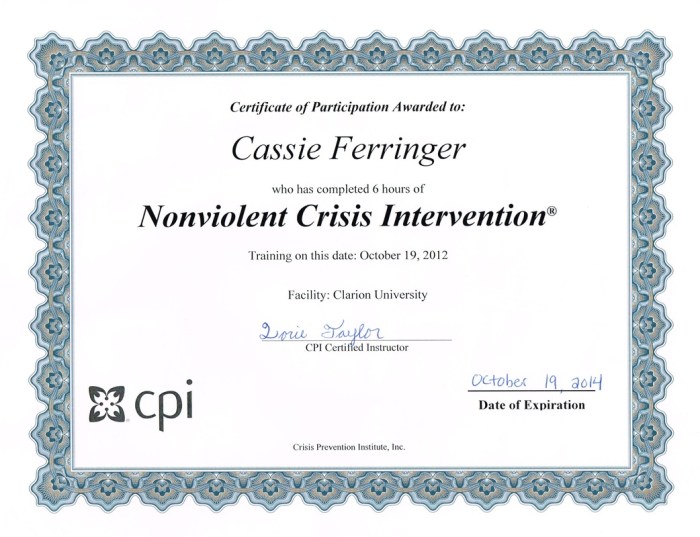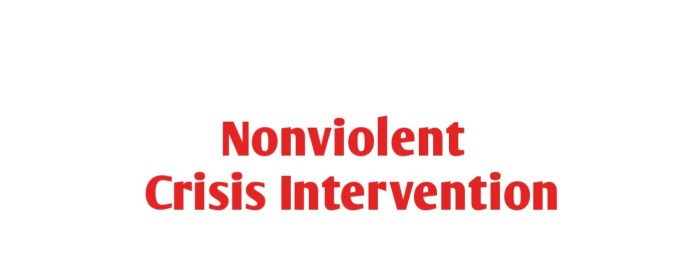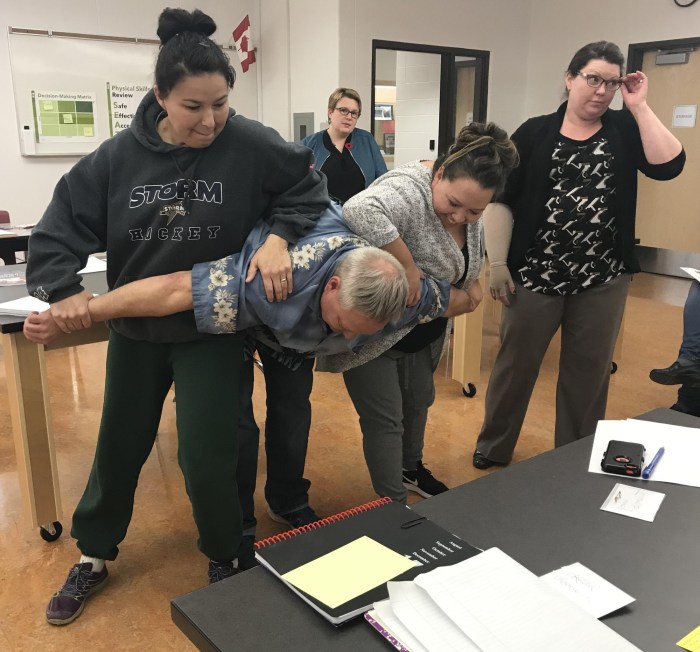Introducing free CPI nonviolent crisis intervention training, an invaluable program designed to equip individuals with the knowledge and skills to effectively manage nonviolent crisis situations. This comprehensive training empowers participants to respond confidently and compassionately, fostering a safer and more harmonious environment.
The training delves into the core principles of crisis intervention, exploring theoretical foundations and practical techniques that enable participants to de-escalate conflicts, reduce aggression, and maintain control without resorting to physical force.
Definition of Crisis Intervention Training
Crisis intervention training is a specialized training program designed to equip individuals with the knowledge, skills, and techniques necessary to effectively manage and de-escalate nonviolent crisis situations.
It is a crucial component of crisis management strategies, as it provides a structured approach to understanding and responding to individuals in distress, preventing harm to themselves or others.
Common crisis situations where this training is applicable include mental health emergencies, suicidal or homicidal ideation, substance abuse crises, domestic violence incidents, and hostage negotiations.
Components of Free CPI Nonviolent Crisis Intervention Training

The free CPI nonviolent crisis intervention training program consists of several key components:
- Theoretical Foundations:Participants are introduced to the principles of crisis intervention, including the stages of crisis, communication techniques, and risk assessment.
- Practical Techniques:Hands-on training in physical and verbal de-escalation techniques, such as verbal judo, non-threatening body language, and safe physical restraint.
- Scenario-Based Training:Participants practice applying the learned techniques in simulated crisis situations, providing a realistic and immersive training experience.
- Role-Playing:Role-playing exercises allow participants to assume different roles and practice responding to crisis situations from various perspectives.
Benefits of Free CPI Nonviolent Crisis Intervention Training
Receiving free CPI nonviolent crisis intervention training offers numerous advantages:
- Enhanced Safety:Provides individuals with the skills to safely manage and de-escalate nonviolent crisis situations, reducing the risk of harm to themselves, others, and property.
- Improved Communication:Teaches effective communication techniques to build rapport, reduce agitation, and facilitate constructive dialogue in crisis situations.
- Increased Confidence:Equips individuals with the knowledge and skills to approach and manage crisis situations with confidence, reducing fear and anxiety.
- Prevention of Escalation:Provides tools to identify and de-escalate crisis situations before they escalate into violence or other dangerous outcomes.
- Reduced Liability:By providing standardized and evidence-based training, organizations can reduce their legal liability in the event of a crisis.
Research has shown that CPI nonviolent crisis intervention training significantly reduces the use of force, injuries, and lawsuits in crisis situations.
Testimonials from individuals and organizations who have implemented the training highlight its positive impact on workplace safety, staff confidence, and the overall well-being of individuals in crisis.
Target Audience for Free CPI Nonviolent Crisis Intervention Training

The free CPI nonviolent crisis intervention training program is particularly relevant for individuals who work in professions that involve interacting with people in crisis situations:
- Law enforcement officers
- Healthcare professionals
- Educators
- Mental health counselors
- Social workers
- Security personnel
- Correctional officers
- Community outreach workers
The training is also beneficial for individuals who may encounter crisis situations in their personal lives, such as family members or friends of individuals with mental health conditions or substance abuse issues.
Accessibility and Availability of Free CPI Nonviolent Crisis Intervention Training
Free CPI nonviolent crisis intervention training is offered by various organizations and institutions.
- Crisis Prevention Institute (CPI):CPI offers a range of free training programs, including nonviolent crisis intervention training, through its website and authorized trainers.
- National Alliance on Mental Illness (NAMI):NAMI provides free crisis intervention training through its NAMI Basics program.
- Mental Health First Aid (MHFA):MHFA offers free and low-cost crisis intervention training programs for the public.
The frequency and availability of training sessions vary depending on the organization and location. Individuals can contact the respective organizations for more information and to register for training.
Continuing Education and Certification: Free Cpi Nonviolent Crisis Intervention Training

Continuing education and certification in crisis intervention are essential for maintaining and enhancing skills and knowledge.
CPI offers certification in nonviolent crisis intervention techniques, which requires completing the training program and passing an examination.
Certified individuals are required to participate in continuing education programs to maintain their certification.
Professional development opportunities, such as workshops and conferences, are also available to certified individuals to stay up-to-date on best practices and emerging trends in crisis intervention.
Helpful Answers
Who can benefit from free CPI nonviolent crisis intervention training?
This training is particularly relevant for professionals in fields such as law enforcement, healthcare, education, and social work who frequently encounter crisis situations.
How do I access free CPI nonviolent crisis intervention training?
Contact authorized organizations or institutions that offer the training. Information on availability and registration can be found on their websites or by contacting them directly.
What are the key components of the training?
The training covers topics such as recognizing and assessing crisis situations, communication strategies, physical intervention techniques, and post-crisis follow-up.